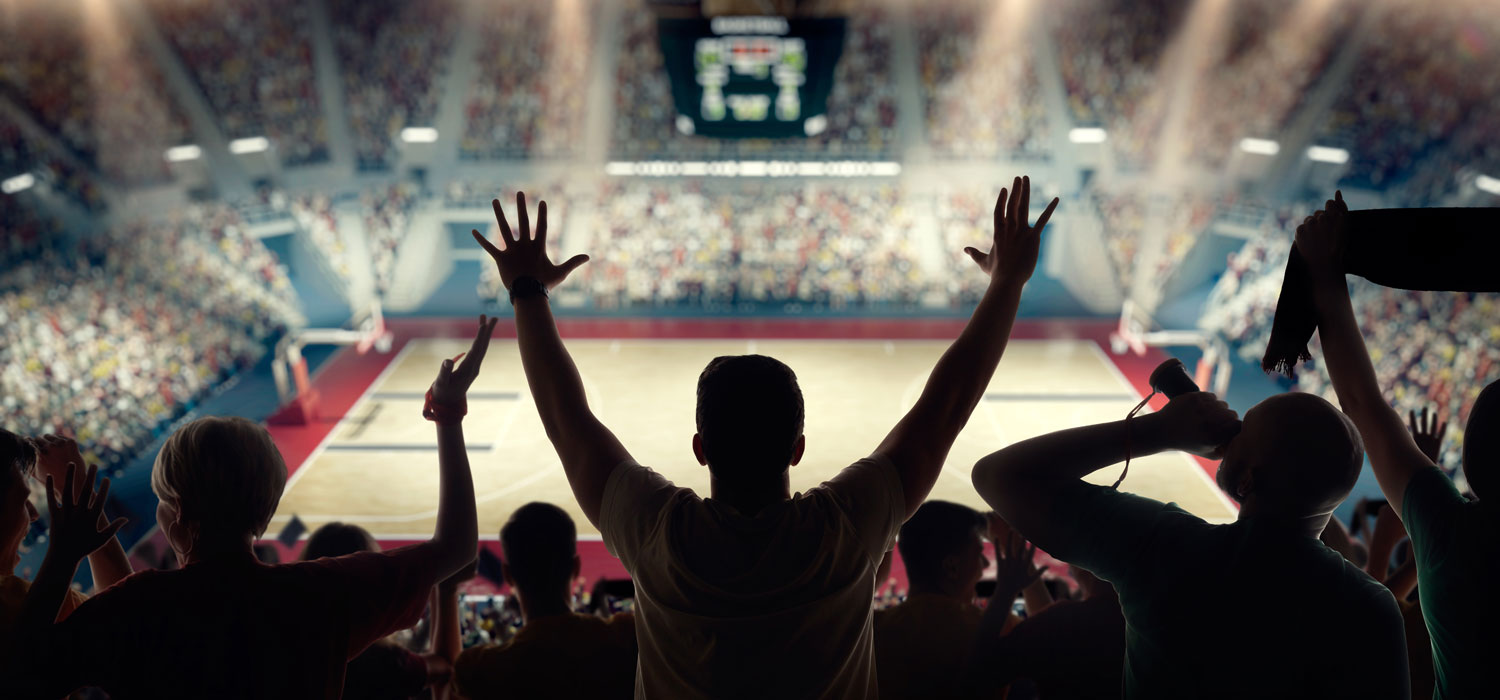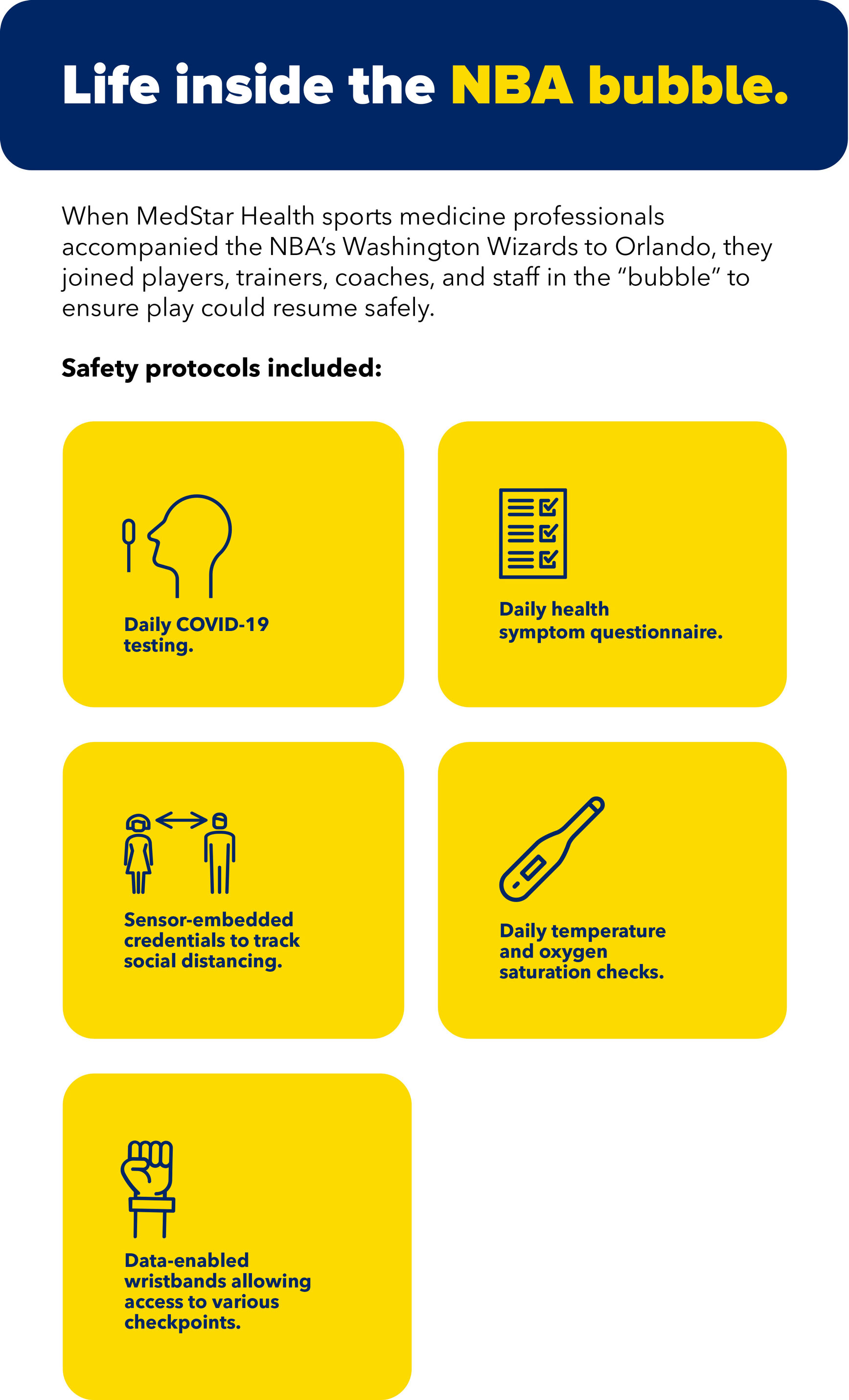
Pictured above are fans cheering at a basketball game.
Starting March 11, 2020, all professional sports leagues in the U.S. began suspending their seasons “until further notice.” For some leagues, the COVID-19 pandemic halted games right in the middle of playoffs. For others, their seasons were just starting. But as the world began to get a clearer picture of the new restrictions and protocols we would all have to follow for the foreseeable future, professional sports organizations began looking for a way to resume play. And they needed the help of experienced medical professionals to accomplish the task safely.
Bryan Murtaugh, MD, and Elizabeth Delasobera, MD, of MedStar Health, serve as team physicians for the National Basketball Association’s (NBA) Washington Wizards and the National Hockey League’s (NHL) Washington Capitals. Each gave their respective teams the medical guidance, support, and care needed to resume team workouts, practices, and games safely.
This meant joining the “bubble.”
The idea of creating an isolation zone or “bubble” for players, trainers, coaches, staff, and medical personnel began a few weeks after play was suspended in March. By May 2020, the NBA's executives brought MedStar Health into discussions with medical staff from around the league and the Wizards organization. Pulling off such a feat involved a high level of care coordination, numerous meetings, consultations with MedStar Health infectious disease specialists, and discussions of policies and procedures with the entire medical staff.
“There was no playbook for what we were doing,” says Dr. Murtaugh. “Figuring out how to get things done was incredibly challenging.”
Find care now
If you are experiencing a medical emergency, please call 911 or seek care at an emergency room.
For the first few weeks of the NBA bubble, which began on July 7 and took place in Walt Disney World in Orlando, five team physicians across the 22 teams made the trip. During this period, Dr. Murtaugh and other medical staff were responsible for taking care of players and staff from across the league, developing protocols, and navigating the difficulties of delivering care within the confines of the bubble.
Daily protocols included conducting daily testing, performing temperature and oxygen saturation checks, answering a health symptom questionnaire, scanning that data onto a wristband that allowed access to various checkpoints throughout the campus, and wearing credentials with an embedded sensor that tracked social distancing.
The health and safety protocols worked, and on July 30, the NBA season picked up where it left off. Dr. Murtaugh spent a total of 6 weeks in the bubble. No player in the bubble tested positive. “It’s a true testament to teamwork,” Dr. Murtaugh says.
For the NHL, playoffs were just about to start when the lockdown took place. The Capitals were one of the 24 teams sent to either Edmonton or Toronto, Canada.
The NHL followed similar protocols as the NBA, and Dr. Delasobera played a key role in ensuring a safe restart of professional hockey.
“These airtight protocols made all the difference,” she said, adding that even the bus driver transporting players from the hotel to the venue was the same person every day and lived within the bubble, too.
Gameplay resumed on August 1. And although the Capitals lost in the first round of playoffs, ending her time in the bubble, Dr. Delasobera said her experience was a reminder of just how important the return of sports was to the community and the world during such a difficult time.
“Finally seeing live sports again on TV was uplifting for everyone,” she says. “Just that small return to normalcy meant so much.”














